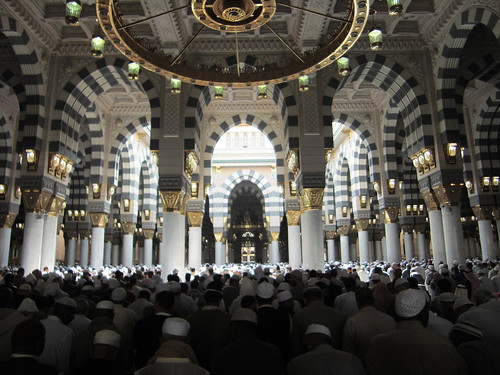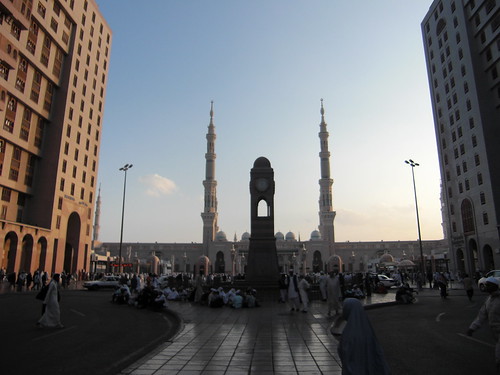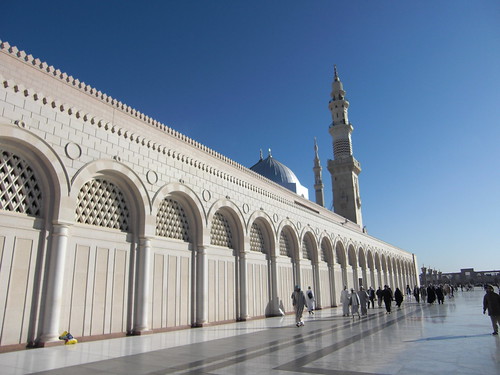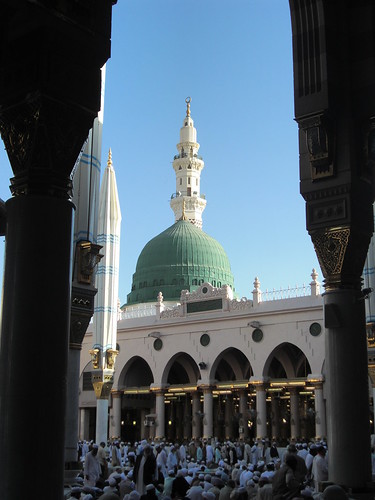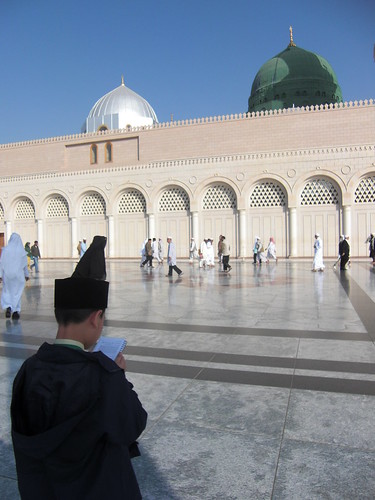
Saturday, January 31, 2009
Wardah's List of Best Reads 2008

Emotional Quran Recitation from Makkah Fajr Sheikh Khalid Ghamdi Surah Imraan
We had just arrived in Mecca. The last week had been a hectic and exhausting whirl of planning, buyings, preparations, and festivities, leaving all of the Mudpie family all caught up in the journey.
We arrived at Jeddah airport, dressed in ihram, the first time for the boys. We endured hours of waiting at the airport, and rode a bus where we slept most of the way, totally jet-lagged.
We sleepily arrived at our hotel, and collapsed on our beds. We were woken up by the first azan of subuh and made our way to the Grand Mosque for the first time. The boys were astounded at the sheer size of the building and the foreigness of the congregation.
We wandered into a doorway tall enough to admit giants, and stumbled our way into the basement of the mosque. The qamat sounded, and we hurriedly placed our mats down and prayed following the imam's voice.
This was the very first prayer the Mudpie family was attending at MasjidulHaram for our hajj. I will never forget it.
The imam broke down whilst reciting Surah Ali Imran.
The atmosphere in the mosque was electrifying - your heart wants to cry with him, but your mind tells you to control yourself and concentrate on the prayer. The few seconds the imam took to recover seemed like half an hour.
For Mudpie, the breaking voice of the imam shocked into him the awareness that he was now in the House of God. No ordinary trip with the wife and kids. All the preparations and hustle left behind.
He is now in the Navel of the World.
Wednesday, January 21, 2009
For Sayfudeen, From Another
January 19, 2009 ·
I thought wrong. The week that I thought was going to be exciting made a U turn. But I guess HE knows better. More.
Tuesday, January 20, 2009
Monday, January 19, 2009
Letter to S.
in a world full of people
Saturday, January 17, 2009
How We Should Help Palestine

Nonviolent Soldier of Islam: Badshah Khan: A Man to Match His Mountains (Paperback)by Eknath Easwaran (Author)
Update : Gaza -Required Reading
Wednesday, January 14, 2009
Blog review : Blogging the Quran

From the authors :The Qur'an is the sacred book of Islam. In the view of Muslims it speaks to all humanity (not just those who believe) but its message is often hard to grasp. Its unconventional structure makes it unlike any other book and its 114 suras (chapters) are not arranged in chronological order but according to their length. Its literary style is considered by Arabic speakers to be neither prose nor verse but something unique.
Muslims have been wrestling with the meaning of the verses and words of the Qur'an from the early days of Islam. Non-Muslims, meanwhile, often have wildly inaccurate notions of its content. These arguments and misconceptions are played out daily on the threads of Comment is free.
Through Blogging the Qur'an, we hope to try and untangle some of those meanings and misconceptions. Over the course of this year,Ziauddin Sardar - writer, broadcaster and cultural critic - will blog the book, verse by verse and theme by theme. There are plenty of theological forums on the internet where the Qur'an is discussed in great detail; our hope is this non-theological exercise will illuminate and inform the political and cultural discussions that take place day in and day out about the role of Islam in world affairs.
If the Qur'an is the source of the religion, then going back to the book should help all those who want to know more. To that end, Guardian writer Madeleine Bunting will help frame each week's discussion by putting the questions to Zia that non-Muslims in particular struggle with when trying to understand Islam.
Readers are welcome to email comments and observations, and we'll publish a selection each week which Zia will respond to. More details of how to join in can be found here.
Each blog will be linked to three translations of the Qur'an on the website of the University of Southern California. For more about the translations, click here.
Illustrations are supplied by the British Museum.
-----------------------------------
Mudpie thinks that this is an interesting experiment, not in Qur'an teaching, or tafsir, but in da'wah. Through this medium one juxtaposes the views of non-believers with believers, and can provide a good platform for discussion. For Muslims who already believe in the Qur'an, it is not a substitute for a proper tafsir course, nor, for that matter, a teacher (the spiritual element of the Quran can only be transmitted to a student personally through a teacher with proper ijazah and silsilah). Nevertheless, for Muslims it can give a good insight into how non-Muslims may perceive what they take for granted as Quranic truth, and ponder how to share their view and belief in response.
I think a very interesting review is found here, by one of the readers of the blog, - Noor al-Yaqeen: How the blog changed me
Tuesday, January 13, 2009
O Medina! Where My Prophet Rests
Coming from the bustling helter-skelter that was Mecca, one who arrives here will instantly recognise that it is a different place altogether. It is clean, well-ordered, peaceful and unhurried. The city, it is said, personifies its most precious resident.
Although most other scholars disagree, and opine that the Ka'abah in Mecca is more holy, all of the scholars are in agreement that the plot of land that holds the self of our Master the Prophet (s.a.w.) is more holy than even the Ka'abah.
Other than that, the Ka'abah is the most holy place on Earth.
Our Master said -
"Whosoever visits my grave, it is guaranteed for him my intercession".
The Prophet (s.a.w.) said - "Whosoever performs the pilgrimage but does not visit me, then indeed he has forgotten me".
The Prophet (s.a.w.) said - " a prayer in my mosque is better than a thousand prayers at any other place besides the Masjid alHaram.".
As we walked, the song by Raihan surfaced in my mind -
Kan pasti mengalir air mataku
Kerna pancaran ketenanganmu
(trans. by me)
How great this life would be
If your face I could only see
The tears would flow most certainly
Bedazzled of your serenity
Alangkah indahnya hidup ini
Andai dapat kudakap dirimu
Tiada kata yang dapat aku ucapkan
Hanya tuhan saja yang tahu
(trans. by me)
How great this life would be
If I could embrace your body
No words exist that I can say
Only God knows the words in me
Ya Rasulullah Ya Habiballah
Tak pernah kutatap wajahmu
Ya Rasulullah Ya Habiballah
Kami rindu padamu
Allahumma Solli Ala Muhammad
Ya Rabbi Solli Alaihi Wasallim ( 2X )
(trans. by me)
O God's Prophet, O God's beloved
Never have I laid eyes upon you
O God's Prophet, O God's beloved
Yet how much I do miss you
God bless Muhammad
O my Lord, bless him and give him peace (2X)
I realised how much I yearned for him.
I missed my other father, my teacher, my hero, my inspiration, my solace.
A wave of emotion seized me, and my breath whispered the words of the song.
It stuck with me all the times I approached the Mosque whilst I was in the city.
In spite of what the Wahabis or the modernists say, I know that my Prophet lives and never dies.
He lives and loves me and he hears me, and he is there - even if I cannot see him or hear him, his spirit lives on and he sees me and hears me.
Before I embarked on this hajj I was apprehensive about how I would feel when I meet him, I thought I would have so much to be ashamed of, so much to be sorry for.
However, when I was there, all those feelings evaporated, like they were never there at all, ever.
In an indescribable way, deep in my heart of hearts I just felt that he was telling me everything is okay, that he forgives me, and he understood, and that he loves me anyway, for whatever I am.
I felt he was telling me that I was not going astray, that I must have faith and patience, that no, the world is not going to the dogs like it seems - it is a beautiful, beautiful world but I must try harder to see with the eyes of my heart and not the eyes of my head.
None of this will make sense to anyone else reading this, but I don't care.
Love knows no definition nor reasonable cause.
And there is no greater humanly love than the unconditional love of the man whom God refers to as rahmatan lil alameen - the mercy to all the worlds.

And at that moment, I was with the one that I loved.
Alone amongst hundreds of other lovers.
Being where he rests makes all that I read and hear and think about him real and present.
There, behind that long wall, behind that grille, lays the one thing that stands between me and the eternal hell.that I justly deserve and that awaits me - the man who I weepingly hope and pray will intercede for me before God and save me.
Since then, whenever I hear or say Allahuma salli ala Muhammad, it has a different, deeper meaning.
A meaning that only two secret lovers will ever understand.
I brought my 3 sons, one by one, to visit him.
We waited for hours each time to get in to the Raudah - the part of the mosque where the Prophet said was a slice of paradise on earth.
I pointed out how tiny the actual mosque of the Prophet was, and tried to picture the greatness of the man in the smallness of the place.
I pointed out how small Syidatina Aishah (r.a.)'s house was - it now houses the blessed tomb - that it is no bigger than our own living room.
Yet that little hovel is now the most precious piece of real estate in the world, that a billion Muslims would give their blood and lives to keep safe.
We reflected how the Prophet was master of all Arabia when he passed on, but he lived in such a humble abode.
The boys were expecting grandeur, palaces, halls, like from their trips to Europe.
All there is, is just a tomb.
When we walked past the grille enclosing the blessed tomb, I told them - there, behind there, lies the man who loves all of us, more than even your mother and I love you, and he will rescue you from hell.
It was because of him that God created everything, including you and me.
We cannot see him now, but he sees us and hears us, right this minute.
Just as I will be sad if you do not remember me and love me after I die, he is sad if we do not remember him and love him.
We must always remember him and love him.
He is our king and our hero.
The guards shooed the emotional crowd away, and we went outside the building.
We walked around to the outside wall of the mosque, and positioning ourselves opposite the great green dome, we gave our salutations to the Prophet, to the two Caliphs who are resting next to him.
All 3 of them said yes.
It was all that a father can ever ask for.
Monday, January 12, 2009
Malay Kids School Performance Drops
Minister in charge of Muslim Affairs says it is not because Malay organisations are not doing enough.
From Berita Harian (in Malay).
Mudpie's take - how can anyone blame Malay organisations for not doing enough? The other communities are nowhere close to the Muslim organisations when it comes to educational assistance programmes. Anyway, the duty of educatiing a child rests with his parents, not organisations. In this blame game, the buck must stop at parents.
Sunday, January 11, 2009
Gaza - Required reading
 With all that is happening in Gaza, Mudpie is reminded of this book which he bought in Kinokuniya about 5 years ago. If anyone asks him for a book to catch up on what is Gaza all about, he will recommend this book.
With all that is happening in Gaza, Mudpie is reminded of this book which he bought in Kinokuniya about 5 years ago. If anyone asks him for a book to catch up on what is Gaza all about, he will recommend this book. Palestine is a graphic novel written and drawn by Joe Sacco about his experiences in the West Bank and the Gaza Strip in December 1991 and January 1992. Sacco gives a portrayal which emphasizes the history and plight of the Palestinian people, as a group and as individuals.
Plot summary
The book takes place over a two-month period in late 1991 early 1992, with occasional flashbacks to the expulsion of the Arabs, the beginning of the Intifada, the Gulf War and other events in the more immediate past. Sacco spent this time meeting with Palestinians in the West Bank andGaza Strip and the narrative focuses on the minute details of everyday life in the occupied territories, presenting the daily struggles, humiliations and frustrations of the Palestinians.
Sacco’s visit to Israel and the occupied territories is presented chronologically, from his arrival to his departure, through dramatic scenes with only a handful of diversions to present the historical and personal background. Most of the scenes in the book are conversations between Sacco and Palestinians, and though the events they talk about are presented visually the dialogue is always present as a form of narration for the events.
Sacco devotes whole pages to drawings of the destitution and squalor prevalent in the occupied territories. Though Sacco is the principal narrator at times he steps aside and allows other characters to present their stories uninterrupted and without interpretation. In his drawings, though most of the panels are presented as a “side view” of Sacco, other characters and their surroundings, there are several panels which present the scene as it looks from Sacco’s point of view. There are also panels which present a bird’s eye view of places like the refugee camps or Jerusalem.
In Palestine Sacco positions himself knowingly as the westerner going to the Middle East to confront a reality unfamiliar to his American audience. Sacco does not delude himself that as a "neutral" observer he can remain invisible and have no effect on the events around him, instead accepting his role and concentrating on his personal experience of the situation. Though his goal is to document events and interview Palestinians he is affected by the reality of the occupied territories and cannot help but participate in, and comment on, demonstrations, funerals, roadblocks and encounters with soldiers. Towards the end he becomes even more active as he shares food and lodgings with the Palestinians he interviews and even breaks curfew with them while in the Gaza Strip.
In the book Sacco references Joseph Conrad's Under Western Eyes, Apocalypse Now, and Edward Said's Orientalism to draw links between the situation he is witnessing and colonialism. Towards the end of the book Sacco acknowledges that he has not reflected Israel enough, that it would take a whole other trip to present that side of things.
The graphic novel, published in 2001 by Fantagraphics Books, is an assembly of nine stories first published in comic form in 1993; the single volume edition includes an introduction byEdward Said. In 1996, the comic was awarded the American Book Award by the Before Columbus Foundation.
Helping Gaza
MEDIA STATEMENT
SPECIAL COLLECTION
FOR HUMANITARIAN RELIEF EFFORT IN GAZA
The Rahmatan lil Alamin (Blessings-To-All) Committee established by the Islamic Religious Council of Singapore (Muis) will coordinate a special fund-raising effort in aid of the affected victims of the on-going conflict in the Palestinian territory of Gaza, in which many innocent civilian lives have been lost due to the ensuing violence.
2. The Rahmatan lil Alamin Fund will be collected through :
i) donation boxes placed at all 69 mosques starting today, Saturday, 10 January 2009. The boxes will be marked "Special Collection For Humanitarian Relief Effort in Gaza”.
ii) Donation in cash, by cheque as well as online. The cheque should be made payable to “MUIS” with the words “Humanitarian Relief Effort in Gaza” written on its back. The cash and cheques can be delivered to the Muis Headquarters at No 1, Lorong 6, Toa Payoh, Singapore 319376. Online contributions can be made through the Muis' E-services (Donation) website. For further clarification, you may also contact Muis at 6359 1199 during officer hours.
3. In addition to the above effort, the Harmony Centre is also collaborating with other faith organizations to raise donations to support this humanitarian cause. More information on this will be issued later.
4. In the meantime, the Singapore Muslim community prays that the parties to the conflict seriously work toward a cessation of violence and be given the courage and compassion to resolve their conflict by peaceful means. We pray that peace and harmony return swiftly to the lives and citizens of Gaza.
5. Muis would like to express its deepest sympathy for the victims of the conflict and their families. We hope our small contribution will, in a small way, ease the lives and help to alleviate the sufferings of all the victims of the conflict.
MAJLIS UGAMA ISLAM SINGAPURA
10 January 2009
Tuesday, January 06, 2009
Returning from hajj
Sunday, January 04, 2009
Trials and tribulations
Mrs Mudpie and I have a very simple approach about going to the Holy Land for hajj.
It is not up to you to decide to go, it is up to God to decide that you can come.
When he decides, nothing will stop Him from getting you there, except your own lack of will.
You can have all the niyyat and will and preparation to go, but if God is not inviting you, then you will not go.
And God decides that you will not go because He knows something that you do not know of, and that you are not ready for it.
This year’s hajj was a lesson in this.
Many people who were approved and had paid up to go, were suddenly rejected when the Saudi government slashed the quota.
All sorts of recriminations were hurled at MUIS by the people who were rejected.
There was a lot of accusations of favouritism, unfair selections, and all sorts of other stuff, all of which were negative, and not to mention, sinful and unbecoming of guests of God. Which proved the point, if only they could see it in themselves.
Some people came to me and told me that it was unfair for me, Mrs Mudpie, and the children to be approved, because we were not first timers, and the children were still young.
Our places should have been given to those who have not gone, and those who were old. It made me feel uncomfortable and guilty.
Mrs Mudpie was clearer in her conscience.
First of all, we did not choose to approve ourselves, let alone did we do anything to cause the others to be rejected.
Secondly, our family registered to go for this hajj as far back as in 2004/2005, and passed over 3 offers of hajj in the previous years before taking up this one.
True, some people who were older or were first timers were rejected, but they all applied to join the queue only less than 6 months ago.
Why did they not get in the queue like we did, Mrs Mudpie asked.
What is the point of having a queue registration system then?
Should we be penalised for having planned ahead, and should priority be given to those who did not plan?
We had told ourselves that if we are cancelled by MUIS due to the reduced quota, we would just accept it and plan to go next year, but Alhamdulillah, we were not.
So I do not understand why others do not see it the same way.
Ah, someone said, what happens if, while waiting for next year, the person dies, or becomes occupied by something else that prevents him from going?
To my mind the response to that is simple - if that happens then it becomes proven that God did not want him to go then.
Like everything else, God's will is carried out based on His complete understanding of everything, and it is always for the best, even if we cannot see it.
One should just accept it, and move on.
God knows best. He just does. He works in mysterious ways, and He tests us.
Some examples - There was a lady with us, a very nice, unassuming lady.
She had a hard life - her husband died and she had to raise her children on her own, and take care of her late husband's parents as well, as her husband was their only child.
She had not thought seriously about going for the hajj, as finances were rosy, but a related couple was going, and invited her to join them.
She agreed, and left all the planning, etc to them. In the end, it turned out that they got rejected, but she was approved - subhanAllah.
When that happened, she did not even know what her hajj package was, as she had left it all to the couple.
Such is the way of God - He will bring to His Holy Land whomsoever He wishes.
I made friends with a fellow pilgrim who came alone for his second hajj.
He had a phobia of crowds and crowded places - he ends up in an anxiety attack in Orchard Road on weekends, and has difficulties breathing when he boards a crowded train.
When he told his family of his plan to go for the hajj the first time a few years ago, his father asked him whether he was out of his mind? Did he know the kind of crowds he was going to be caught in over there?
My friend persevered and went on, leaving the matter to God. SubhanAllah - Glorious is God - he said the minute he arrived in the Holy Land, all his phobias disappeared.
He went through all the crowds and turmoil with no problem. he thought he was cured of his phobia - except when he returned home, it was back again.
This time, again, the phobia was lifted from him the minute he entered the Holy Land.
He has no explanation for it, and neither was he looking for one, other than the Divine one.
In my group there was a very prominent person.
He was a man with one leg.
He was born with one leg uselessly deformed and diminished, and he grew up without ever learning to use an artificial leg, nor a wheelchair, nor even a walking stick.
He just hopped on his one leg everywhere he went!
You can imagine how precarious it all was, everyone was concerned that he would fall or trip or something.
I got to know him, and learnt that it was his second hajj too.
He had had a difficult life - never being sent to school as a child due to his disability, and having to work difficult menial jobs due to his lack of education - on one leg.
When I talked to him, he struck me as a person who is so full of thanks and satisfaction with life.
It made me think of all the dissatisfactions I had felt about not having this or that, or wishing I had more of this or that, when I should be thankful I have a complete physical form in the first place.
It made me re-think my attitude that I was having - that I was fortunate, thanks to God, that I had the means to afford the pilgrimage for my whole family, whereas most people would just scrape by to afford to go for themselves once in their lives.
I was blessed at an even more basic level than that by God - that my family and I had health and complete physical forms in the first place. I suddenly felt very privileged to have what everyone else had - except this man - a complete pair of feet.
Reminded me of the Sufi saying - I went to the mosque to pray for a pair of shoes, and God showed me a man with no feet - I ended up thanking God that I had feet, forget the shoes.
Whilst I was there, I saw very old, feeble pilgrims, struggling to make every step of their way in the midst of maelstorms of crowds pushing about. I saw women from remote villages from remote parts of the world confused and frightened by the size, crowd and bustle of the pilgrimage. People who were experiencing their first ever ride on an escalator. An Indian man who read from his own, very old, yellowed and dog-eared copy of the Quran, instead of reaching out for one of the thousands of new copies provided at every pillar of the mosques. An old African woman marvelling at the wonderful embroidery of a Malaysian woman's telekong. I saw thousands of pilgrims from all over the world just sitting for hours, reading and re-reading the Quran, most of them not knowing Arabic, and many with accents and reading styles strange to our ears.
For some reason, reading the Quran is something that one naturally desires to do in the Haram - somehow God's word being spoken through one's tongue in His house, as if He is speaking though you.
It is said that for every hajj, the prophets Khidr and Elyas perform the pilgrimage as well, and one could well meet one of them there unknowingly.
The truth is, if you look about, you will see the Prophet's spirit in the eyes of every one of the pilgrims.
Their externals may appear peculiar and different from us, and they may appear course or rough by our standards, but inside each one of them lay their own story of why they made the journey to the Holy Land.
It is most apparent when they first arrive and set eyes on the Ka'abah - there, at that precise moment, all that is in the heart bursts forth in an unexplainable and inexpressible manner of tears and relief.
You may not see it on their faces, but in the heart of every pilgrim is the heart of a saint - one yearning for the One, and being reunited with Him.
On the Day of Judgment, when I meet my Lord, I hope it will be with the same sentiment.
Thursday, January 01, 2009
Observing 'Ashura
1. Allah (Subhanahu wa Ta'ala) accepted the repentance of Adam ('Alaihis-Salaam) after his exile from Paradise;
2. Allah (Subhanahu wa Ta'ala) saved Noah ('Alaihis-Salaam) and his companions in the ark;
3. Allah extinguished the fire in which Abraham ('Alaihis-Salaam) was thrown by Nimrod;
4. And Allah (Subhanahu wa Ta'ala) spoke directly to Moses ('Alaihis-Salaam) and gave him the Commandments.
5. Ahab ('Alaihis-Salaam) was restored to health (from leprosy);
6. Joseph ('Alaihis-Salaam) was reunited with his father Jacob ('Alaihis-Salaam), whose sight was restored from blindness;
7. Jonah ('Alaihis-Salaam) was taken out from the belly of the fish;
8. the sea was divided as the nation of israel led by Moses ('Alaihis-Salaam) was delivered from captivity and Pharoah’s army was destroyed.
9. the kingdom of Solomon ('Alaihis-Salaam) was restored to him after he lost it;
10. Jesus ('Alaihis-Salaam) was raised to heaven.
Now, Ashura is commemorated with a great deal of significance amongst the Shi'a Muslims.
So, if you are a follower of the Ahlussunnah wal Jama'ah (Sunni for short), you would do well just to note the above list and not get yourself involved in any other acts, as they would be forbidden to you as bid'ah.
The Shi'a have their own reasons and basis for what they do, and these would not be compatible with the beliefs of the Sunnis, so if you are Sunni, beware, but be respectful and let the Shi'a have their way.
God knows best, and God is the best of Judges.

